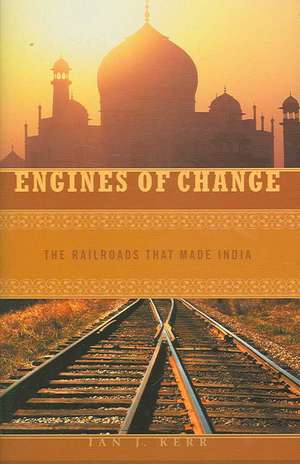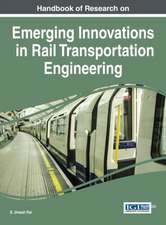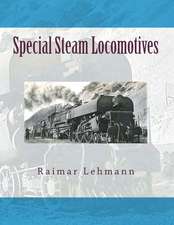Engines of Change: The Railroads That Made India
Autor Ian J. Kerren Limba Engleză Hardback – 29 dec 2006 – vârsta până la 17 ani
Preț: 357.70 lei
Preț vechi: 416.25 lei
-14% Nou
Puncte Express: 537
Preț estimativ în valută:
68.45€ • 74.33$ • 57.50£
68.45€ • 74.33$ • 57.50£
Carte tipărită la comandă
Livrare economică 23 aprilie-07 mai
Preluare comenzi: 021 569.72.76
Specificații
ISBN-13: 9780275985646
ISBN-10: 0275985644
Pagini: 224
Dimensiuni: 156 x 235 x 24 mm
Greutate: 0.6 kg
Editura: Bloomsbury Publishing
Colecția Praeger
Locul publicării:New York, United States
ISBN-10: 0275985644
Pagini: 224
Dimensiuni: 156 x 235 x 24 mm
Greutate: 0.6 kg
Editura: Bloomsbury Publishing
Colecția Praeger
Locul publicării:New York, United States
Notă biografică
Ian J. Kerr is a retired Professor of History and Senior Scholar in the Department of History at the University of Manitoba. He is also a Professorial Research Associate in the Department of History at the School of Oriental and African Studies at the University of London. His publications include Railways in Modern India (2001) and Building the Railways of the Raj (1995).
Recenzii
[A] highly readable, thoroughly researched analysis of the development and impact of railways, their technology, and their people on the Indian subcontinent..Just as the best way to see India is by train even today, Kerr's book is the best way to grasp the historical saga of the fire vehicle and its contributions to the economic, political, social , and cultural integration of India.
The Indian railroad system is among the most fascinating in the world, says Kerr, a retired history professor, and he recounts its birth and growth since the 1850s, with an emphasis on the impact it had on the political and economic development of the country. For the first century, until 1947, it was a colonial railroad system designed to serve the imperial occupation, and has continued to be shaped by the colonial legacy after independence and partition, he explains.
. . . an excellent overview of the history of the railways of India from an economic and social perspective.
The Indian railroad system is among the most fascinating in the world, says Kerr, a retired history professor, and he recounts its birth and growth since the 1850s, with an emphasis on the impact it had on the political and economic development of the country. For the first century, until 1947, it was a colonial railroad system designed to serve the imperial occupation, and has continued to be shaped by the colonial legacy after independence and partition, he explains.
. . . an excellent overview of the history of the railways of India from an economic and social perspective.












